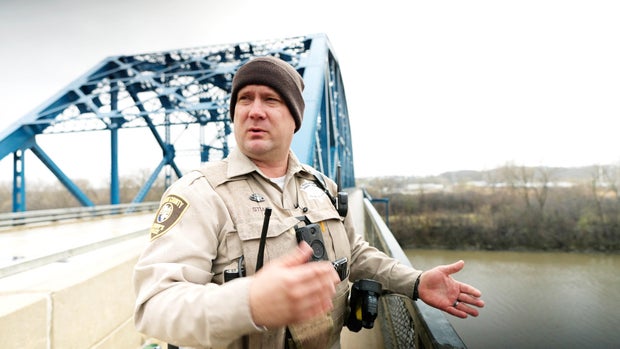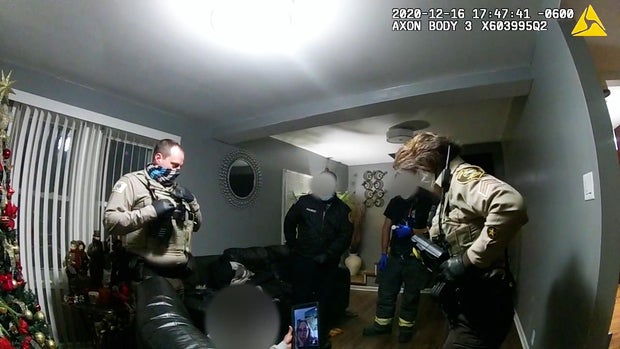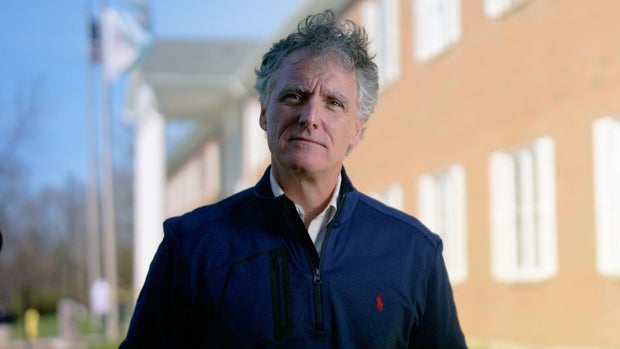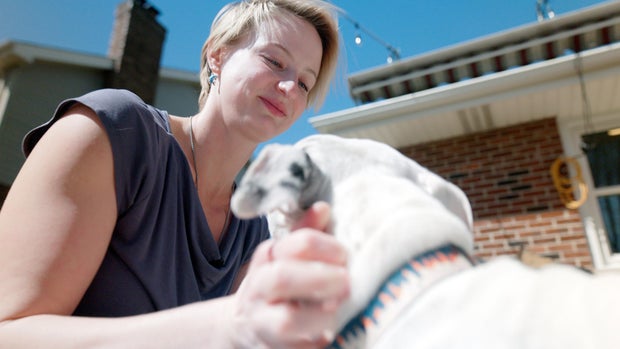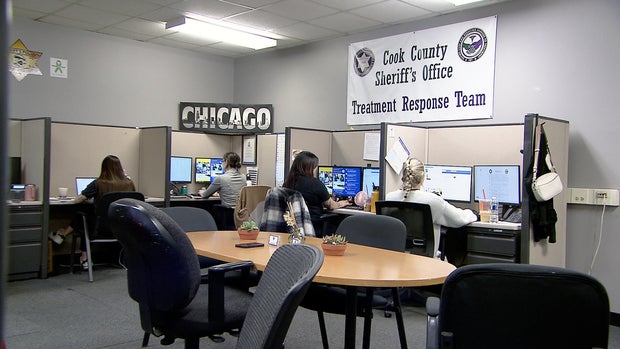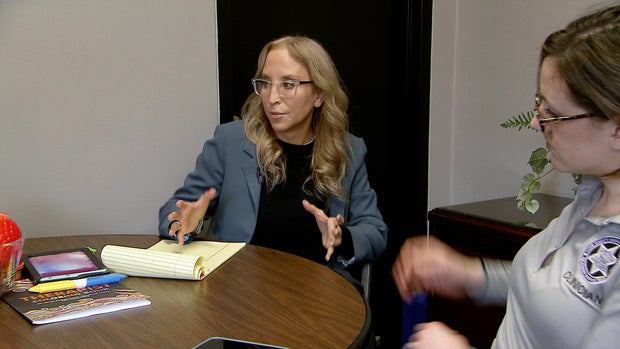Officer Dave Stiak didn’t know what to expect when he got a call that someone was hanging over the railing of a bridge in Lemont, Illinois, a suburb of Chicago.
Stiak, a police officer for the Cook County Sheriff’s Office, was on patrol with his partner in February when the calls came in.
“He was standing outside the safety railing and people were yelling at him,” Stiak said. ‘He didn’t respond. He looked at the sunset. They said it looked like the man was going to jump.”
Stiak gradually came closer to the man, being careful not to rush him.
“I was able to reach out and put a hand on his shoulder and comfort this man…I give the man a hug,” Stiak said. “My partner was there at the right time. We pulled him over the railing again.”
Ryan Beard/CBS News
The result was good, but it could easily have been worse. Stiak is the first to admit that the police are not best qualified to guide people in crisis.
“They don’t train you [like] this is exactly what you do: this is step A through Z of how to talk someone off a bridge,” Stiak said.” It’s not really a police thing.
New ways to de-escalate mental health crises
Calls like the one Stiak encountered are why cities across the country are experimenting with new ways to de-escalate mental health crises. After the incident, Stiak gave the man a card with contact information for the sheriff’s Treatment Response Team, which can become involved during or after a mental health call.
The team is available 24/7, and while some alternative programs may send a limited number of mental health workers onto the streets, the Cook County Sheriff’s Office is putting doctors in the field as part of the 911 call response virtually – via Zoom.
The sheriff’s office launched the Co-Responder Virtual Assistance Program, or CVAP, in late 2020. It allows officers to engage doctors via tablets to speak directly to people in crisis on the scene without endangering responders.
In the U.S., about one in four fatal law enforcement shootings involves a person with a serious mental illness, according to a report from the Treatment Advocacy Center, an organization that pushes for reforms to treat mental health issues.
“In these situations where you encounter someone in crisis, the best you can hope for is that you walk away and they walk away safely,” Stiak said.
The new virtual assistance program for co-responders
Elli Montgomery, executive director of the Treatment Response Team, talked about the first co-responder case, which she considered a success.
“An officer who was very hesitant to work with us and was not interested in doing so, but had tried everything to de-escalate a person who was off medication, is a boxer who suffers from bipolar disorder,” described she. “He had used some substances. He was not stable.”
Courtesy of Cook County Sheriff’s Office
Montgomery said the man repeatedly engaged in self-harming behavior.
“He hit his head on the ground,” she said. ‘He had hit his head. I was just trying to crack his head open against the wall.”
Then a sergeant on the scene gave the man a tablet. Body camera footage from officers at the scene shows the man sitting in a chair as Montgomery listened and spoke to him. He was able to discuss what happened and Montgomery eventually convinced him to walk to the ambulance. The officers no longer had to force him to get help.
Police meet people in crisis
Cook County has received more than 1,000 calls for suicidal individuals and more than 1,300 welfare checks since 2020, according to a CBS News analysis of 911 data.
According to the Treatment Advocacy Center report, the risk of being killed while being approached or stopped by law enforcement is 16 times greater for individuals with untreated serious mental illness.
That scenario is playing out again and again across the country.
Substitutes shot and killed a 15-year-old in Apple Valley, California, in March who was reportedly armed with bladed gardening tools. Police previously visited the house five timeswhenever the individual is taken to a mental health facility.
New York police officers shot and killed a 19-year-old man in front of his mother and brother in March during a mental health crisis. He reportedly ran towards officers with a pair of scissors.
These are just some of the examples that highlight the complex mental health crises that police across the country face every day.
‘The police are not the experts’
In some alternative programs, dispatchers are required to screen 911 calls to ensure that doctors are not placed in dangerous situations. Even then, the circumstances described by a 911 caller can differ drastically from the scenarios officers experience when they arrive.
A CBS News data analysis of CVAP calls since 2021 found that nearly 57% of calls from peer responders were reassessed as having a mental health issue and about 22% of calls involved substance use disorders.
Cook County Sheriff Tom Dart said CVAP gives officers unrestricted access to advisors in complex situations where police are not the experts.
“When the 911 call comes in, you send a police officer with police training to a home,” Dart said. ‘That’s fine if it’s a criminal case. The majority of calls everyone gets [are] based on mental health care, and we’re sending the wrong person there.”
Ryan Beard/CBS News
Use of the co-responder program has increased, with 269 calls last year, according to an analysis of sheriff’s office data.
It found that the most common reasons for using the co-responder program included domestic problems, suicide attempts and citizen assistance.
“If you talk to just about anyone in law enforcement, they will tell you that the calls they get, whether it’s a domestic issue or a mental health issue, is not the first time they’ve been in that house.” Dart said. “They go to these houses again and again.”
“We need someone there who is well trained to de-escalate.”
Emily Dahl, a single mother diagnosed with bipolar disorder, has had several run-ins with police. Her family has had to call officers to her home during manic episodes.
She remembers a time when she barricaded herself in the bathroom.
“I ended up biting a police officer because I was in the shower,” Dahl said. “The police had been at the house for over an hour trying to get me to the hospital, and I was terrified.”
It would not be the last time there is physical contact with the police. Dahl said in one instance, when she locked herself in a room with her son, officers had to break down the door.
“They were concerned about my son’s safety,” she said.
Ryan Beard/CBS News
Agents were virtually unable to bring in consultants in those cases, but Dahl thinks it would be helpful to have one.
“If you’re in fight or flight, you can’t reason with someone in that condition,” she said. “So I think we really need help there with doctors. We need someone there who is well trained to de-escalate.”
Finding qualified mental health professionals has become a challenge since the pandemic. According to the National Institute for Health Care Management, approximately 49% of Americans live in an area experiencing a mental health workforce shortage.
Tim Horstman/CBS news
Sheriff: This program could work anywhere
Dart’s office said CVAP covers 31 suburban police departments with just 12 employees, with plans to add eight more departments this year. The program serves about 791,000 residents and costs $1.2 million a year, according to figures from the Cook County Sheriff’s Office.
Their data shows that an in-person model, which would require more than 130 employees, would serve only a fraction of the population and cost an estimated $12.9 million per year.
Tim Horstman/CBS news
“We can’t predict mental health emergencies,” said Montgomery of the Treatment Response Team. “So why would I put a salaried employee in a car who might not have anyone to work with for eight or 10 hours?”
Montgomery said the co-responder model offers the best of both worlds, with an officer providing safety and the doctor providing mental health support.
Sheriff Dart said he couldn’t think of a place where this program wouldn’t work.
“For me, success is getting the right services to the right people right away, not theoretically in the future, but right now,” he said.
If you or someone you know is in emotional distress or a suicidal crisis, please contact the 988 Suicide and Crisis Lifeline by calling or texting 988. That is also possible chat with the 988 Suicide & Crisis Lifeline here.
For more information about mental health resources and supportThe National Alliance on Mental Illness (NAMI) HelpLine is available Monday through Friday, 10 AM to 10 PM ET, at 1-800-950-NAMI (6264) or email info@nami.org.


